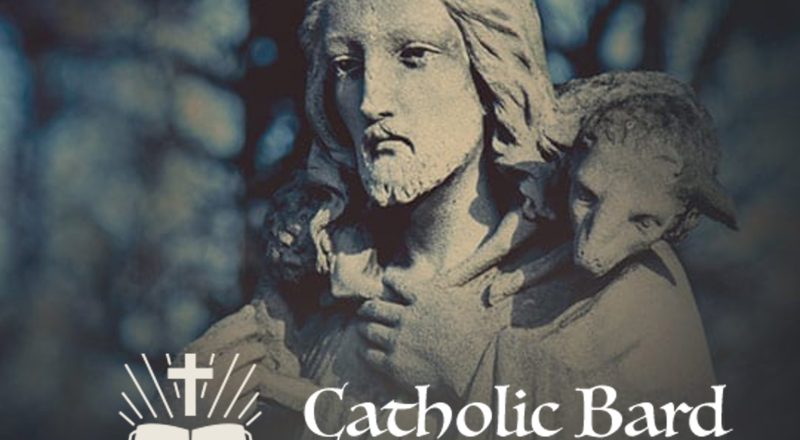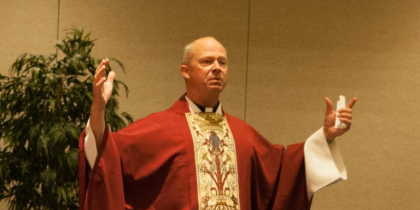Last week, another leader in the Church has suggested we should change our teaching on homosexuality. However, “should” implies there that the one doing the action is able. However, the Church has no power to change her teaching on homosexual relations.
Let’s look at what the Cardinal said, look at the Catechism, look at magisterial teaching, and note what a change would imply.
Card. Jean-Claude Hollerich on Homosexuality

Recently KNA, a German Catholic news source, interviewed Card. Hollerich. He stated, “I believe that the sociological-scientific foundation of this teaching is no longer correct.” But, where did he get that the foundation of the immorality of sexual acts between persons of the same sex was sociological-scientific? The moral issue goes much deeper than mere sociology or whatever aspect of science he refers to.
Hollerich is far from the first bishop to propose this. I’ve written about Bishop Franz-Josef Overbeck of Essen in 2019. In 2021, CNA interviewed me about Bishop Peter Kohlgraf of Mainz.
The Catechism on Homosexuality
I think it is important to note that the Catechism strongly distinguishes homosexual individuals and homosexual acts. We are all tempted to commit sinful acts, and each is tempted more by certain types of acts than others. Temptation is not sin. Having a specific temptation more than another one is not sinful.
The Catechism has three paragraphs on homosexuality: 2357-2359.
The first paragraph notes homosexual acts are immoral. “Basing itself on Sacred Scripture, which presents homosexual acts as acts of grave depravity, tradition has always declared that ‘homosexual acts are intrinsically disordered.’ They are contrary to the natural law. They close the sexual act to the gift of life. They do not proceed from a genuine affective and sexual complementarity. Under no circumstances can they be approved.”
The second paragraph notes that we should respect persons with such tendencies. “They must be accepted with respect, compassion, and sensitivity. Every sign of unjust discrimination in their regard should be avoided.”
The Third calls them to chastity. “Homosexual persons are called to chastity…. By prayer and sacramental grace, they can and should gradually and resolutely approach Christian perfection.”
Magisterial Teachings on Homosexuality
The Church has been consistent in her condemnation of homosexual acts. I cited nine different ones in this prior piece in the National Catholic Register if you want to go in-depth. Here’s the conclusion:
For 2,000 years, the Church has not wavered in her teaching on the immorality of homosexual acts. There has not been a definition in the extraordinary magisterium but the ordinary universal magisterium can be infallible if taught universally with regard to time and place. The immorality of homosexual acts is an infallible teaching of the Church in the ordinary universal magisterium. Thus, the Church cannot change this teaching no matter how much certain priests might wish it changed.
Basis of Church Teaching
Despite Hollerich’s claim of a sociological-scientific foundation, that does not appear to be the basis the Church uses. She has based herself on Scripture, on tradition, on a deeper understanding of marriage and human sexuality. I think this can be best understood today by starting with the nature of marriage as one man and one woman, forever, for the sake of children and their mutual benefit. All sex outside of a marital relationship is gravely sinful.
Many parts of sociology and science support this, but we can’t reduce morality to them. Science can tell us if a sexual act is of the type that might produce children or not, but it cannot tell us if it is moral or not. Parts of sociology can help in understanding how we operate in society. But we can’t reduce sociology to a fancy academic version of public opinion. Ethics can gain from information gained from science and sociology, but we can’t reduce ethics to science and/or sociology as neither has ethics as its proper object.
Implications from a Change
MInority Report on Birth Control
Back in 1966, Fr. John Ford, SJ and others who defended the Church’s teaching on birth control released what became known as the minority report of Paul VI’s birth control commission.
In it they note logical consequences if the Church were to approve birth control:
Once one has set aside this traditional principle, one would also be setting aside a fundamental criterion, up until the present time unshaken in its application to many acts which have always been considered by the Church to be serious sins against chastity: The case of extra-marital sexual relationships of those whose living together… The case of sexual acts in marriage, for example, oral and anal copulation… the door is opened easily to the licitness of masturbation… direct sterilization would be permitted as well.
We can see how this has happened. Many other Churches and society as a whole had such effects once they said contraception was acceptable.
This report goes further:
many theologians, who maintain that contraception is not intrinsically evil, seem to come to this conclusion from a more general principle: that, namely, which denies all absolute intrinsic morality to external human acts, in such a way that there is no human act which is so intrinsically evil that it cannot be justified because of a higher good of man.
This report indicates accepting homosexual acts as moral might be a consequence of accepting birth control as moral.
Implications Today
I think today we have similar issues with homosexuality. If the Church changed her teaching here, she would need to base it on something. I see no basis for the change that would not also destroy the basis for other sexual morality. I can’t see an argument that allows homosexual acts but does not also allow fornication, marriages with more than two people, masturbation, “open” marriages, etc.
This may even go further. Leaving the realm of sexual acts, changing church teaching in this area would have dramatic negative ripple effects on theology. As Stephen White noted:
Conclusion
Card. Jean-Claude Hollerich is making a suggestion that is impossible. He is suggesting the Church change her position on homosexual acts. But this is a consistent teaching from Scripture and tradition so she has no power to change it. Furthermore, were the Church to change this teaching, any basis would also destroy much more in Catholic ethics. The Church must stand firm in her teaching.
EDITS: I realized a typo & that I had forgotten to link to Hollerich’s comments on a news site.










I can’t understand how men such as Hollerich become priests, bishops, and cardinals with such a poor understanding of Catholic teaching and human biology. I pray to Our Lord that he never becomes pope! He does not worry about the Truth, only about how far he can modernize Catholic Church teaching without causing a break. This is the issue I will not budge on one little bit on. Sociology is a bunch of garbage if it is not informed by the Truth.
Honestly, this comment killed any chance he might have had. There is no way 2/3 of the college of Cardinals will elect someone who said that.
The lavender mafia is pressing its hand.
but the magisterial record is clear.
It would not be surprising if many pushing for a ‘change’ have wrestled with temptation on this front and lost.
I think it would help if faithful expositors of Christian teaching – or, in this case, human teaching – would avoid weasel words in the headline such as “…Teaching on Homosexuality”. Does “homosexuality” refer to perverse sexual acts, or to those who desire to engage in perverse sexual acts? Why don’t we just agree that homosexuality doesn’t exist, and relate to it as such?
I hope I was clear about this. If you follow the Register link to my piece citing a whole series of magisterial documents, I clarify this further.
Stephen White asks: “Do those advocating for the Church to change her teaching on this matter realize that it would fundamentally revolutionize just about every teaching the Church has?” I think that many of them not only realise it but actually want it.
The continuum slope from development of doctrine down to change of doctrine is a slippery one.
What change advocates don’t realize is that admitting change opens the door to:
– uncertainty insecurity in the hearts of the lay faithful
– knock-on negative effects to other doctrines
– all sorts of possible changes that they might not like!
As to this particular issue… the Anglican church has already gone down this road, along with a thousand other changes, and the denomination continues to shrivel.
for what its worth, I work with OCIA/RCIA candidates and many are from other churches. One of the big attractants to them is the stability of Catholic doctrine 🙂 despite the winds of secular social change.
And people go to Reconciliation (confession) to these guys…..
Morality is a reflection of what is generally acceptable in society. It will therefore vary according to time, place and culture. There have been (and still are) many different codes of morality throughout history and in different parts of the world. It is therefore not appropriate to try and apply the code of morality that applied in the Middle East 2000 years ago to countries in the West today. Until fairly recently slavery was considered quite acceptable (including by the Catholic Church) but now most people would consider it immoral. The Church teaches that God creates everyone “in his own image”. By condemning any group in society (in this case homosexuals) the Church is saying that God’s image simply isn’t good enough, when the bible clearly says that God looked on all that he had made and saw that it was good. The Church is therefore guilty of blasphemy and needs to change it’s doctrine before God finds out!
This is cultural relativism. It is a false ideology. It is self-contradictory
1. Is cold-blooded murder, rape of children, etc. always immoral? The cultural relativist would need to say no as morals are only determined by the culture and there is no universal morality.
2. The idea of cultural relativism is itself a culturally conditioned morality. It only arose in modern culture: so, by its own standard, it is not true in an absolute sense, but only culturally true in this culture.
Don’t confuse the issue with philosophical waffle. The biblical standard of morality is “Love the Lord your God with all your …… and love your neighbour as yourself. Quite simple and straightforward. If you love your neighbour as yourself you will not do them any harm. Therefore of course murder and rape are universally immoral. But consensual sex between adults does them no harm. The only harm that is done is to the sensitivities of a church that refuses to adapt to current conditions.
By your lack of comment on my other point are you asserting that people with homosexual tendencies are not made in the image of God. How can you possibly justify this?
You wildly misunderstand several points so I thought I would just point out your most blatant contradiction.
Everyone is made in God’s image but has temptations to certain sins. Which sins are stronger temptations does not change that.
If you reduce the ethics of sex to consent, you completely misunderstand Christian sexual ethics beyond a line or two in a blog comment.
I am not “reducing the ethics of sex” to consent alone. The other important element is the intention to form a long term relationship. Genesis clearly tells us that God saw that “it is not good that man should be alone”. We are designed to live in relationships. I realise that with your conditioned mind-set you will say “yes, that’s why God created a woman, not another man”. This obviously had to be the case in the beginning when the clear imperative was to “go forth and multiply”. But we are now well past the stage where we need to keep multiplying. A reduction now in the birth rate will relieve the pressure on the environment that is causing so many problems. Homosexual relationships in this situation can only improve the situation while remaining true to God’s observation that “it is not good that man should be alone”. And we all want good for society ….. don’t we?
“I am not “reducing the ethics of sex” to consent alone. The other important element is the intention to form a long term relationship.” That is not what you said: “But consensual sex between adults does them no harm. The only harm that is done is to the sensitivities of a church that refuses to adapt to current conditions.” A long term relationship you intend to add seems to basically be the same thing just over time, and not one night.
Father, You mis-state when you say that the Church has a 2000 year history of opposing homosexual acts. I find no such teaching in patristics. Later teachings tend to deal with ALL lack of chastity. It’s important to recognize that Jesus never said anything about same sex relations in the Gospels. Living in the Greco Roman world he certainly would have been aware of them. Jesus does provide us with teachings on marriage and heterosexual behavior. Had homosexuality been a concern for him he would have included it in his code of morality. Somehow I think that your energy would be better spent promoting His teachings.
Really? a simple google search brings up this list of patristic citations. https://www.catholic.com/tract/early-teachings-on-homosexuality
This is Jesus’s teaching and has always been Church teaching. We do better trying to help people with those tendencies to live a Christian life than mislead them by saying sex between people of the same sex is morally OK.